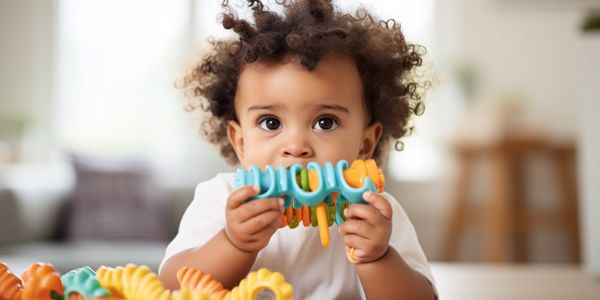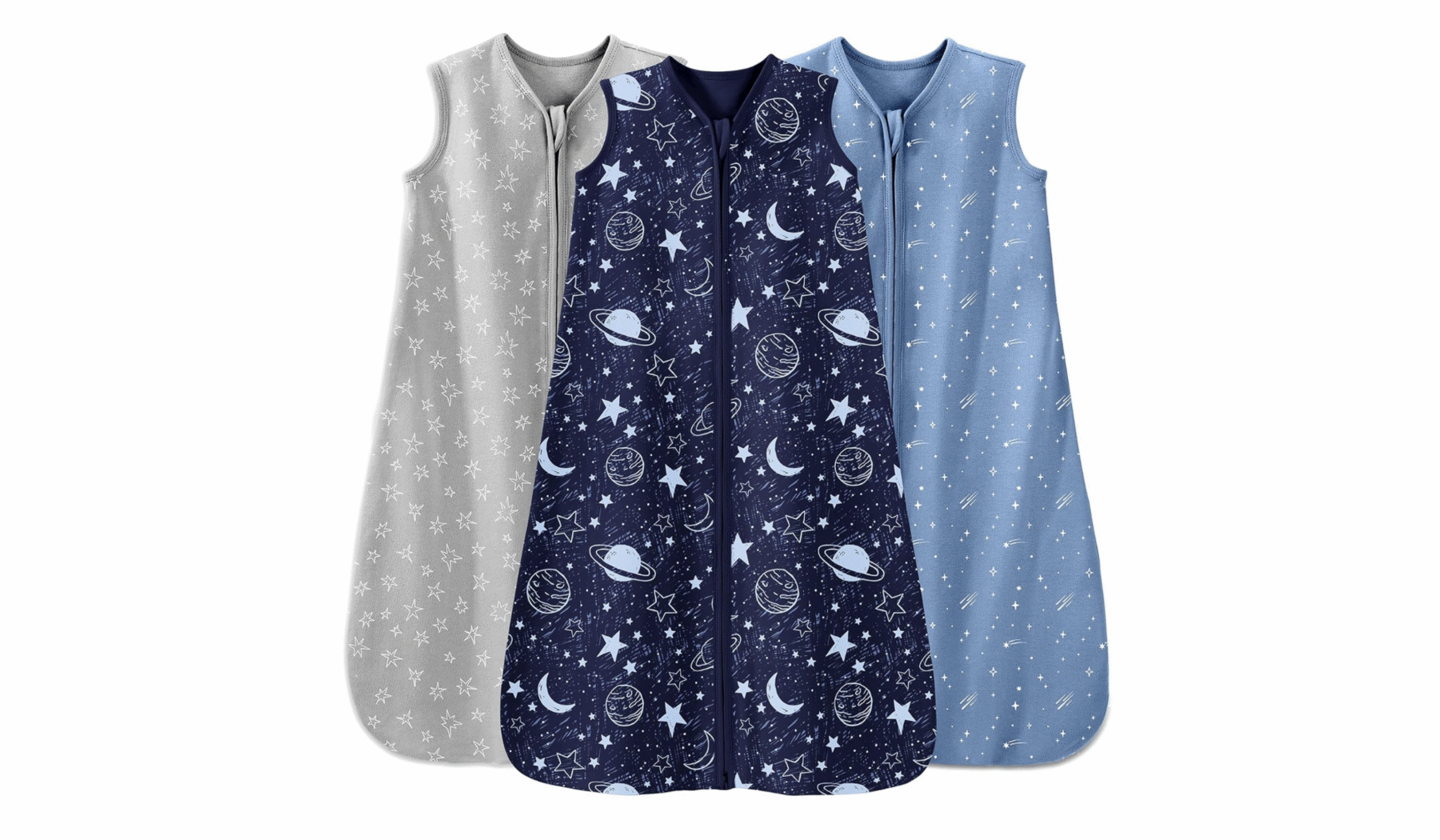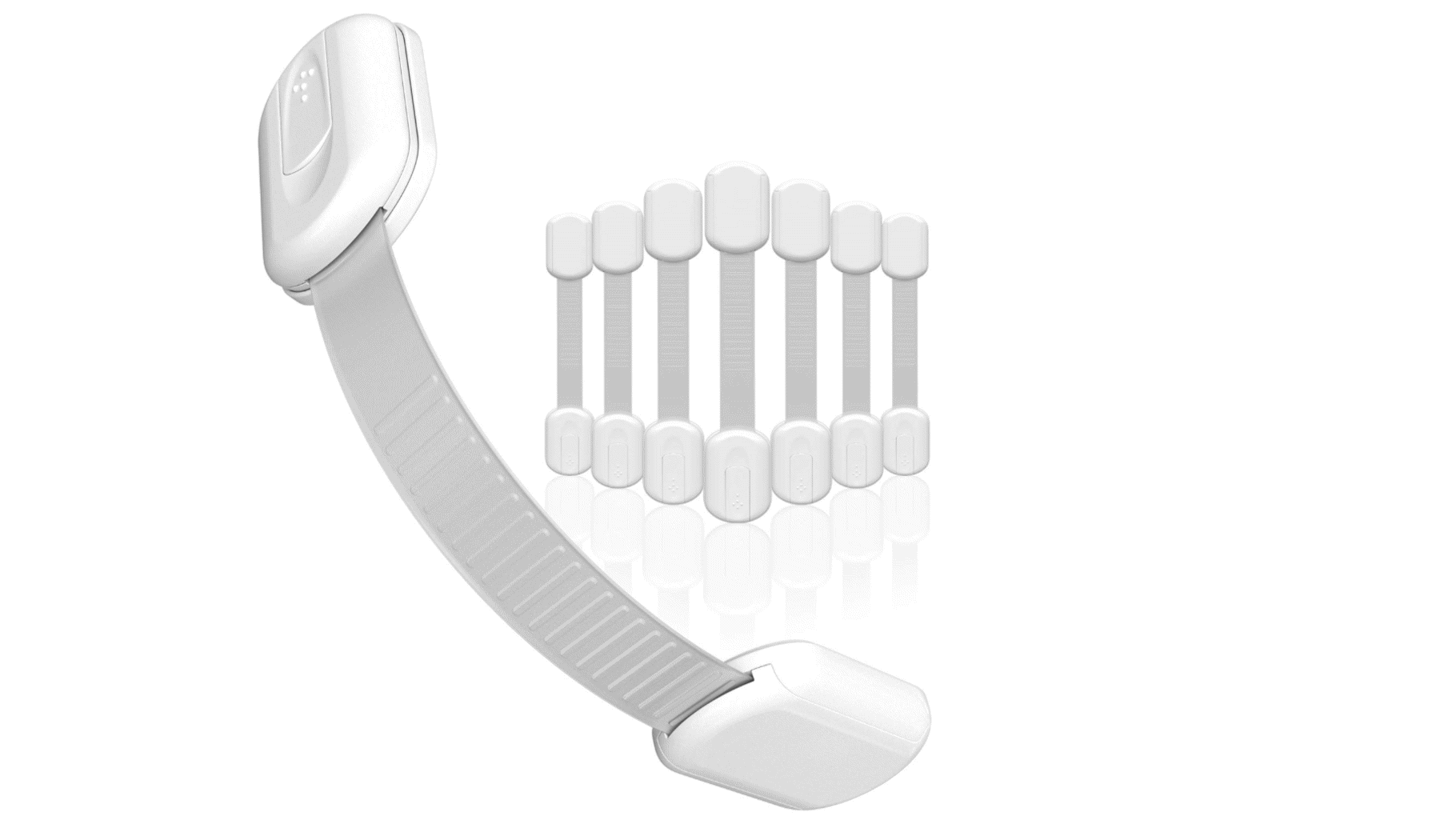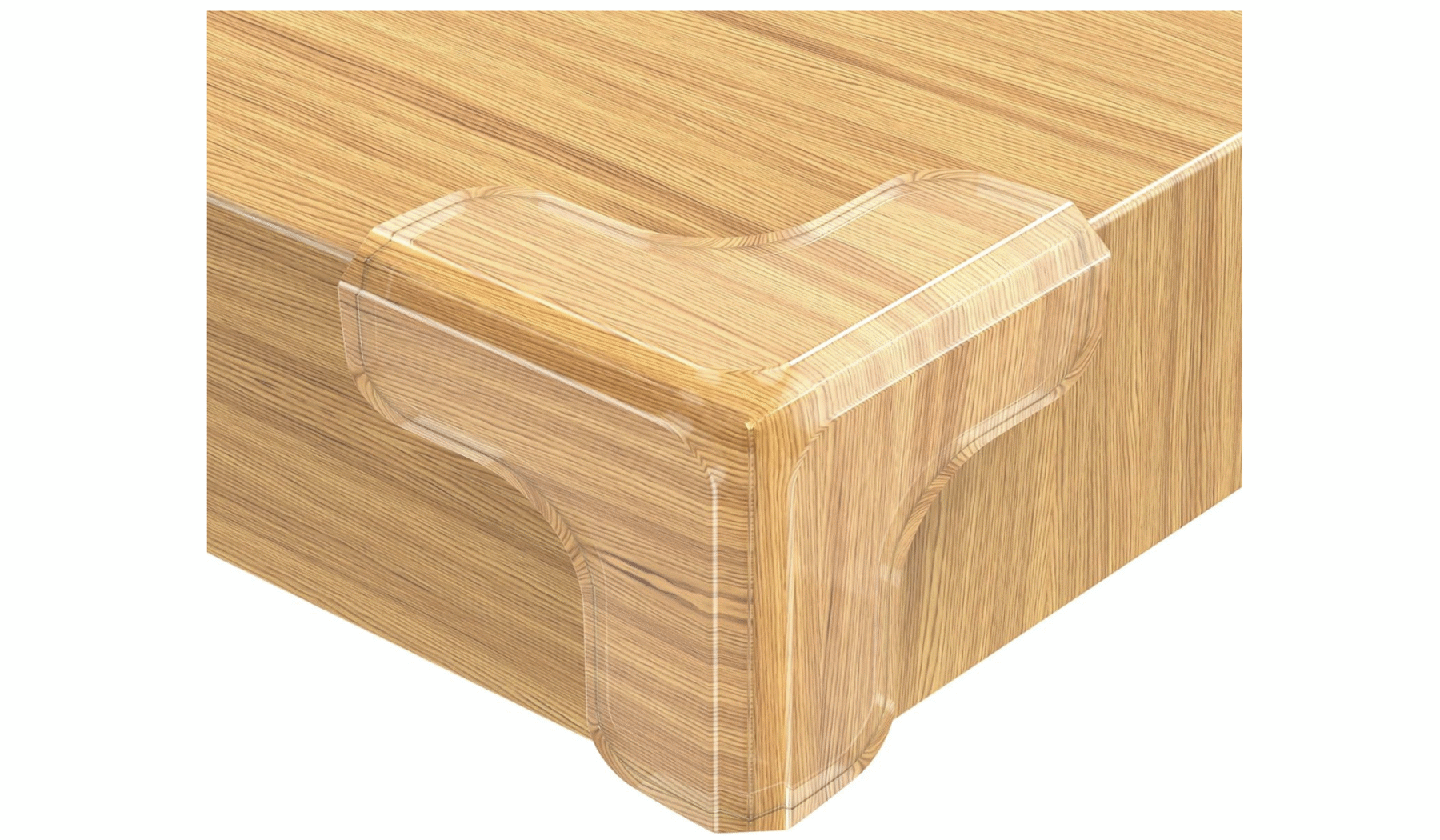8-Month-Old
Around this stage is when babies begin experimenting with piecing sounds together. In addition to babbling and other noises your little one enjoys making, they might start forming simple words pretty soon, such as "mama" or "dada.”
Don't let it get to you if their first word is not what you eventually want them to call you. At this stage, your baby has only pieced together sounds, not meaning, so just because your little one can say a word now, it does not mean they have connected meaning to it or know what they are saying.
Whether you are transitioning your little one to solid foods or want them to extend breastfeeding, they should get most of their nutrients from fluids. At eight months, babies should consume between 750-900 calories per day, 500 of which should come from breastmilk or formula.
At mealtimes, it is essential to always provide your baby with the milk they drink before any solid foods you are introducing. This way, even if they don't enjoy or finish the new food you introduce that day, they first receive all the necessary nutrients from the milk you gave them.
Your little one will have had plenty of practice learning how to eat by now! In addition to the average 25 ounces of breastmilk or formula that your little one will consume each day, there are a variety of foods you can start getting them familiar with. Don't forget iron-rich foods, such as green vegetables and red meat.
At this stage, you still want to introduce your little one to plenty of new and fun flavors to get them used to it. Fruits are one of the best ways to introduce exciting flavors to your little one, and you can expect some funny faces as they taste the sweet juices for the first time! Squished blueberries and soft fruits like bananas cut into small pieces are great choices.
After a couple of months of weaning experience, your baby should feel more comfortable with new textures. It's a great time to introduce new finger foods. Try leaving any mashed foods a little bit lumpier to get them used to this texture.
The amount of food your baby eats each day depends on their preferences and interests, which will vary daily. Babies under twelve months old don’t need snacks between meals, so if you think they are still hungry, don’t be afraid to add an extra milk feeding if they don't eat much one day.
Remember that it can take up to ten times for your little one to try a food before they get used to the texture and the flavor, so don't give up on a food if they don't eat it the first time. You should never force your baby to eat anything they don't want, and it's a great idea to encourage self-feeding at this stage to help your little one's hand-to-mouth coordination.
If you have already started the introduction of sippy cups to your baby, continue to give them the option to drink water out of them, even if they treat it as a toy. Eventually, your little one will get the hang of it and learn that sippy cups are meant for drinking from, even if they play with them for a while beforehand.
Before your baby starts crawling around with some speed, it's essential to baby-proof your home. This involves getting down to your baby's eye level and identifying potential hazards. Secure heavy furniture to the wall, cover sharp corners, and use safety gates to block stairs and rooms that are not baby-friendly. Remove small objects that can be choking hazards, as well as toxins. These include, but aren’t limited to:
Designate a safe area in the home for your baby to crawl and explore. Ideally, have this area in the living room or where your family spends the most time. Use soft play mats or rugs to provide a comfortable surface. Clear the area of any cords, small objects, or items your baby could put in their mouth. Ensure that electrical outlets are covered, and use safety latches on cabinets and drawers within reach.
While creating a safe environment is crucial, supervision is equally important. Babies can move quickly and unexpectedly, so keep a watchful eye on them at all times. Avoid distractions and stay within arm's reach to prevent accidents. Crawling should always take place in a controlled and secure environment.
Around this time, many babies revert to their night owl tendencies, which may cause you to wonder where their once predictable sleep patterns have gone. This phenomenon, known as the eight-month sleep regression, indicates your little one's development as they explore the world around them.
Babies commonly drop their third nap of the day around six or seven months. This comes at a time that also sees them making huge jumps in their development with rolling, crawling, and essentially spending a lot more of their time on the move! With so much energy being used and getting used to longer wake periods, it's common for babies to become overtired. This can lead to difficulties during bedtime and cause disrupted sleep.
As previously mentioned, it's not uncommon for your little one to develop a strong attachment to you around this stage as they become more socially aware and their emotional bond with you deepens. While it might be most apparent around strangers and new people, this could also impact bedtime. As your little one becomes used to the bedtime routine, they might recognize the time you leave, and when they no longer have eyes on you. To battle this, follow these tips:
As you become more comfortable with your new role as a mother, you may still be coming to terms with your new identity. Not too long ago, your life looked astronomically different. Now that you are a parent, your priorities and responsibilities have shifted, resulting in a shift in identity for many mothers.
Knowing you are not alone and speaking to other mothers who are currently in or have been in the same position as you can be beneficial. It's important to understand that your body and mind are still changing even eight months after giving birth. Being overwhelmed and confused is okay and nothing to feel discouraged about.
Joining a support group can be just what you need! This will allow you to let your feelings loose and feel validated by others who know how you’re feeling. If a support group is not your style, talking with a trusted loved one or journaling and letting what’s on your mind out can also be the release you seek.
The moment your baby starts to crawl is an exciting milestone, marking a new phase of exploration and development for them. But, as a parent, it's natural to experience a mixture of emotions, ranging from joy to worry at this time. As your little one gets on the move, it's important to navigate this transition with confidence and a balanced perspective and give them the independence they need.
Bumps, falls, and tumbles are an inevitable part of your baby's crawling journey! While it's natural to feel concerned about your baby getting hurt, remember that these minor incidents are part of their learning process. As long as you've taken the necessary safety precautions and removed hazards, allowing your baby to explore and occasionally stumble helps them develop spatial awareness, balance, and coordination.
While it's tempting to scoop your little one up at the first sign of struggle, resist the urge and encourage them to problem-solve on their own. Whether it's navigating around obstacles or figuring out how to change direction, these challenges are great for their cognitive and motor skill development.
Ultimately, you have the best ability to gauge your baby's comfort and safety. Trust your instincts when assessing potential risks and deciding when to intervene, but remember to trust the process. When you let go of the minor worries, your intuition will help you strike the right balance between promoting independence and ensuring their safety.
Since your little one has begun moving around more, they can occupy himself independently for more extended periods of time. It is likely for babies at this stage to be more independent than before, especially when it comes to playtime. Since they can move around and grab things without assistance now, your little one might enjoy their newfound independence and prefer to play alone.
As they continue to play on their own, your baby will discover all the things they are capable of doing without your help; they can move further than they thought, they can crawl out of your sight, and they can move toys on their own.
This new phase of development might spark some nerves since you want your baby to continue learning, exploring, and developing, but you also want to make sure they are safe while doing so. Here are some activities that will allow your baby to explore, be independent, and play, all while your nerves remain controlled.
When your little one is entertaining themself, talk to them from across the room as you watch them from a distance. Your baby will hear your voice and know you are there as they continue to explore. Another option for this activity is stepping out of your baby’s sight as they explore but continuing to talk to them.
Your baby will hear you and know you are present even if they can’t see you. Your little one might be just as nervous about their newfound independence as you are, so hearing your voice will reassure them that they are safe.
If you have an adventurous little explorer, you may even try leaving the room for an extremely quick moment. Tell your child, “I’ll be right back,” as you leave the room for a few seconds and return shortly after. This will allow your baby to feel independent while reminding them that anytime you leave, you will always return.
As you know firsthand, emotions can be overwhelming and come out of nowhere. Sometimes, there is a clear reason for feeling the way you do, and other times, you may feel just as confused as to why you are stressed when a wave of emotions rushes over you without warning. Your baby experiences mixed emotions and waves of frustration, too.
It is important always to validate your little one’s feelings just like you would anyone else. Using your words to verbally label what your baby is feeling and why they are feeling that way will make them feel loved and understood.
For example, your baby will be more easily flustered by things when they are hungry or tired, just like you might notice in yourself. If your baby starts crying after a long day or they skipped their nap and are becoming emotional, hold them close to you as you validate their feelings. Explain to them that you understand why they are feeling this way and that there is a reason they are feeling this way. It can help to say something along the lines of, “You are overwhelmed and tired right now.
I hear you, I know you are exhausted, you missed your nap and need some sleep. Let’s go down and try to relax together.” Validating your little one’s feelings and making sure they feel heard and loved will help them to calm down and alleviate tension in situations like these.
Your little one is surprising you each day as they develop physically and emotionally. You can expect your little socializer to smile and giggle more now, too. Watch your baby light up when you sing their familiar songs and nursery rhymes and how they respond to your voice. Soon enough, your baby will really begin to mature as they master crawling and slowly transitioning from mushy, soft foods to solids!
Your little one's cognitive awareness will continue to blossom each week. Now that your baby knows that people and objects continue to exist even when not in sight. They understand that a toy still exists even when a blanket is placed on top of it, or a larger object is placed in front of it. This leap in cognitive development will allow you to introduce various new activities to your baby.
While your baby continues demonstrating several physical and cognitive advancements, they rely on sleeping and eating to fuel their brain and body. You can expect your baby's appetite and sleep habits to fluctuate, but providing them with encouragement and support through this time is all you can do until it passes.
By now, your little one should be sleeping around 15 hours per day. Not all babies sleep through the night at this stage, so if yours does, consider yourself one of the lucky parents. Between three to four hours of your baby's daily sleep should come from napping, which they will do twice a day for around an hour and a half to two hours.
Some babies regress in sleep progress this month, which can be frustrating since it will also affect your sleep. Keep your cool and remain patient, remembering that your baby is not waking up throughout the night intentionally and needs rest just as much as you do.
Sleep training is not for everybody, but it can be beneficial if you have success with it. Sleep training helps your baby become more independent and helps parents get more sleep at night when successful. In some cases, sleep training can cause unnecessary stress for your baby, who naturally prefers to be near their mother. There are different ways to sleep train, and some may work better for some families than others.
At this stage, your baby is a whirlwind of exploration, rapidly evolving in both size and skill each day. On average, you'll find your baby girl weighing around 13 to 23 pounds, while your little boy might be around 14 to 25 pounds. Length-wise, they’ll measure between 25 and 30 inches in length.
Around this time, you might also notice their facial features changing. The newborn look is long gone, and your little one will be looking more like a little toddler each day. A lot of this is down to their growing hair, and their eyes now carry a cheeky curiosity that lights up the room.
If teeth have already appeared, your baby might proudly show off their toothy grin. But fret not if the tooth fairy has yet to visit. Every baby follows a unique timeline.
Your tiny explorer is now trying to uncover almost everything they can. Expect to witness lots of banging, shaking, and those adorable chubby hands reaching out to grab everything in sight. Every object, toy or otherwise, is just to be investigated by your little one.
Still, while it might seem like anything and everything is catching the attention of your little one, you might also find that their once-loved toys aren't holding their attention for as long as they used to.
Babies have an instinctive way of knowing when something's either too easy or too difficult to hold their attention, and as their little brain grows, it requires more stimulation to keep them occupied. You might notice then casting a quick glance away from a toy that doesn't quite match these growing cognitive abilities. Sensory toys are a great way to capture their attention better. It's all part of their drive to learn and engage with the world as quickly as possible!
By this week, it has likely been a while since you and your partner enjoyed some alone time together. If you feel down, overwhelmed, or like your relationship has been suffering, a date night might be just what you need! If your relationship doesn’t feel as strong as it did pre-parenthood, do not feel ashamed. After eight months of raising your child, almost every aspect of your life has been altered.
Take some time to hire a trusted babysitter, leave your baby with a family member or friend, and indulge in a date night. This will be great for your relationship and also help your baby practice feeling okay when you aren’t present. Whether you try something new or take a trip down memory lane, a date night can be just what you and your partner need to reignite that spark that may have weakened recently.
Getting out and about with your eight-month-old can do wonders for both of you. Fresh air and a change of scenery can brighten your mood, stimulate your baby's senses, and provide a much-needed break from your routine. A walk in the park, a visit to a local garden, or even a shopping trip can offer exciting new experiences for your little one.
If you’re looking to walk at a brisker pace and don’t want to push a stroller around, a baby carrier is an excellent investment. Strapping your baby to your chest not only keeps your hands free for other tasks but also fosters a strong sense of closeness. Your little one will feel comforted by your presence while you can easily go about your day.
Whether shopping, walking, or simply enjoying a coffee with some friends, a baby carrier can be a lifesaver! Your little one is completely comfortable lifting their head up and looking around, so they'll likely benefit from a forward-facing baby carrier to see the world around her!
Since your baby relies on sleeping and eating to continue to grow, develop, and learn, you might need some tips to ensure you are doing everything you can to provide them with what they need. Investing in a set of small, reusable, resealable Tupperware to pack snacks for when you're on the go or save leftovers when your baby doesn’t finish will benefit you.
It would help if you also looked into plates or bowls with suction cups on the bottom as you begin the weaning process to solid foods. Having dishes that suction to the table or your baby's highchair will prevent unnecessary spills and messes. Your baby cannot easily knock over their plate or throw it if it is suctioned down. Always having wipes handy in case of a sticky mess or spill is also a great idea.
As for sleeping, your little one’s habits and patterns have likely been disturbed for a variety of reasons. If you have a baby who is very active and practicing crawling constantly, they might be active in their sleep as well. A baby that moves around at night will likely wake up several times from either banging into their crib walls, getting cold once their blanket falls off, or just waking up from all the movement in general.
Investing in an infant sleeping bag can solve this problem for you. Infant sleeping bags allow your little one to move around but will keep them warm and prevent them from waking up due to a blanket falling off and getting chilly. Infant sleeping bags are also safer than blankets because they do not pose any suffocation hazards.
Where has the time gone? Your little one has made great improvements in motor skills and development! Thanks to all of these developmental milestones they have reached, your baby's independence is strengthening. Feeding by themself is a huge milestone that they will soon reach, possibly even this week! Continue speaking to your little one as often as possible to help sharpen their view of the world and their understanding of the words you speak.
This week, your little one's listening skills continue progressing as they pay attention to every conversation they hear. You can expect more babbling from your little one this week as they attempt to mimic any sounds or words that they’ve heard you use. Babbling back and forth with your baby as if conversing with them can benefit their social development.
As you continue using certain phrases and words each day, your little one will begin developing an understanding of what they mean. As your baby's motor skills improve, they will start crawling, sitting up, and even attempting to stand at a faster pace. This will help them gain a stronger sense of independence.
Your little explorer is making leaps (literally!) in their gross motor skills at the minute. Babies tend to begin crawling between seven and ten months old, so this month could be when they master it.
Crawling is like your little one’s first taste of true mobility, allowing them to venture towards enticing toys or chase after their furry friends.
They'll be on the move much quicker than they have been. If you haven't already done so, make sure to baby-proof your home and keep any hazards away. They’re much faster than they look once they master crawling, and you don’t want to constantly chase after them, worried about what they might pick up.
You will notice your little one is more independent these days, and in terms of motor development, they have improved tremendously from just one month ago. Eating will become more of an independent activity for your little one once their ability to grasp food strengthens and becomes more precise.
Grabbing smaller food items, bringing them to their mouth, and holding their bottle are acts that you can encourage and expect your little one to perform. Once your baby can feed themself, it will likely motivate them to eat more and be excited to try new things.
Other motor skills will strengthen this week, too, resulting in even further independence. Your little one might attempt standing without your assistance this week. While they probably can't stand up entirely on their own yet, your baby will use objects such as coffee tables or chairs as support.
If you see your little one wanting to try walking, assist them as they take a few steps by holding their hands or placing your hands under their arms. Commonly, babies will fall after a few steps, but they will be just fine after doing so.
Lucky for you, now that your baby can move around faster and easier, they will probably crawl to grab their own toys rather than wait for you to pass them over. Overall, your baby’s movements this week will be more controlled as they move with ease and purpose.
Here are some top tips for encouraging these developments:
By this week, your baby has developed both physically and cognitively. If you have worries or concerns regarding the development of your baby, here are some things to keep an eye out for.
While babies do often reach milestones at different rates, there are many milestones that all babies should universally have met by now. If your little one cannot sit up on their own, even after you help them into a seated position, you should seek medical advice. Bad posture or the inability to sit up without folding over, even when propped up, is worth investigating with a professional.
Your baby should be able to recognize you, any primary caregivers, and immediate family members, at the very least, by now. If your child does not recognize familiar faces by now, is abnormally quiet, or is noticeably unsocial, this could indicate something neurological.
Failure to focus on things, determine the source of sound, or follow slow-moving objects are additional red flags that call for consulting a doctor. Yes, babies often fall behind or leap ahead in developmental stages. However, these are all general milestones that eight month olds should not struggle with. It may indicate a developmental complication if your little one demonstrates any of these red flags.
Contact a doctor if you have any major concerns, so they can reassure you or offer further support.
Different parenting styles and opinions on parenting can exist anywhere within a family. Whether you have a brother, aunt, in-law, friend, or parent in your ear giving you unsolicited advice, it is important to keep your cool.
At the end of the day, it does not matter if a family member is trying to force their strong opinions and parenting styles on you because you have the final decision when it comes to your baby. Listening to people rant about what they think is best for your baby can not only be irritating but can be uncomfortable, too.
Remember to choose your battles wisely and try to remain calm before lashing out at someone who thinks they are helping. Of course, you should not be afraid to advocate for yourself and your baby. Still, sometimes, it is better to discuss your frustrations with your partner before starting an argument that can be avoided.
In scenarios where your frustration stems from your partner's side of the family, it can be especially beneficial to discuss the problem with your partner and have them speak to their family member about taking a step back. This will avoid any awkwardness, tension, and harsh feelings between you and your inlaws.
Remember, you're not alone on this journey. Connecting with other parents can provide a support network that understands the challenges and joys of raising your little one. It’s never too late to join local parenting groups or attend baby-friendly classes to share experiences, seek advice, and make lasting friendships.
Baby swimming lessons are another great way to keep your little one busy and meet other parents. Baby swimming lessons start at around three to four months, but many parents wait a few more months until their little one is stronger and a better mover.
If bath time is your baby's favorite time of the day, loving nothing more than splashing around in the water, baby swimming lessons could be the perfect next step! When looking into local classes, keep in mind that the water temperature should be at least 86 degrees Fahrenheit for babies under one year old.
Indulging in stimulating activities will help your baby continue to grow, develop, and reach new milestones each week.
Anytime you can provide your little one with social interaction, do so! Engaging in social groups and activities is a great way to help strengthen your baby’s social skills and memory. Exposing your little one to new people will also help reduce or even prevent stranger anxiety and separation anxiety.
Provide your little one with toys and games that stimulate their curiosity, such as hide and seek with toys, stacking blocks, or engaging in babble conversations.
Engaging in conversations with your baby can help enhance their cognitive abilities, learn new words, and connect meaning to words so they can understand them. The more an activity makes your little one think, move, crawl, or make noise, the better influence it will have on them, leading them to reach new milestones.
Your baby might show a decreased interest in eating throughout the day at this stage. This change in feeding behavior can be a result of several developmental changes they are going through, such as becoming easily distracted.
It is possible your baby now refuses to eat solid foods or, worse, is refusing breastmilk and formula. If your little one suddenly stops showing an interest in solids, it is not the end of the world.
At this stage, it is preferred that your baby eats solids throughout the day since they will be drinking breastmilk or formula at leisure feeds throughout the night, but milk still provides your little one with the nutrients necessary to grow.
According to the World Health Organization (WHO), breast milk is even recommended for babies up to two years old as they wean. Many parents take advantage of extended breastfeeding, so if your little one is in a milk-only phase, continue offering them foods alongside their milk until it passes.
Keep all eyes on your little one this week; you will likely find they are back to putting everything in their mouth.
You can expect your baby's cognitive, social, emotional, and physical development to continue blossoming rapidly. As a result of all their newfound energy, you can also expect lots of napping at random times throughout the day. This means you must keep a flexible schedule and adapt to changes in your baby's feeding and sleeping habits as they appear. Be ready to watch your little learner continue exploring new things and reaching new milestones!
As your baby grows and learns, the milestones they are reaching might vary from those of other babies their age. If they haven't already, you can expect to hear your little one say their first words aside from those consisting of da, ma, and ba sounds.
Your baby might start calling their blanket or favorite toy by a name and stick with it. It will likely be unclear what your baby is trying to say initially, but paying attention to their gestures and where they look as they say the word will help you piece their sounds together and give them meaning.
Your baby is constantly going through changes. Physically, emotionally, and socially, your little one is gaining more confidence daily. You will notice your baby responds to cues you give them these days. For example, if your little one sees you approaching them with something like a toy or a bottle, they might reach out their hands for the object you are holding.
If your baby doesn't reach for the object immediately, pause for a moment and give them the opportunity to before handing it to them.
When reading to your little one, they might attempt to mimic you by trying to turn the page of a book or grab the book to hold it open. These are some signs that your baby's social development is flourishing alongside their receptive language. As your baby gains new skills, such as standing on their own or taking a few steps with the support of nearby furniture, their confidence will ascend!
This is great for your little one's social development and will lead them to interact with others more confidently. You can expect your little one to show off these new skills to anyone who will watch and show excitement!
As you support your little one's social and emotional growth, you might witness a new and remarkable display of empathy this month, known as reflexive crying. This occurs when your baby cries or becomes distressed upon seeing another baby cry.
It's a heartwarming example of your little one's growing capacity to connect with the emotions of those around them. This empathetic response is a glimpse into their social awareness, highlighting their ability to sense and mirror the emotions of others.
By this stage of your little one’s development, they will be able to understand many words and even communicate some by themself. Babies can communicate their needs in a variety of ways.
Not only will your little one understand simple phrases such as “no” when you express them, but they will also be able to communicate “no”! Your baby communicates the word “no” in various ways through their actions. When they want to say “no,” your little one might turn their head, or if it is feeding time, they might shut her mouth and look away.
Some other simple phrases your baby can understand and communicate back to you are “hi” and “bye.” When your baby hears you say these words or when you signal them, they will demonstrate that they understand with a wave or an attempt to repeat the word back! While there are few words your baby can communicate verbally, they will be able to use signals and motions to show something has caught their attention.
You will know when something sparks the interest of your little one because they will likely point to it or try to reach for it. In these ways, your little one will show you they understand what you are saying and try communicating back!
By eight months after giving birth to your baby, you have been recovering from your pregnancy for almost as long as you were pregnant. This means you have had almost nine months to adjust to your new role as a parent, get back to your old habits, and get back into shape.
Remember, it took you nine months to put on the pregnancy weight that you gained to sustain your growing fetus inside of you, and it can take just as long, if not longer, to take it off. While you have likely been getting back into moderate exercise, continue taking it slow and keeping it manageable. Don’t go overboard or push yourself too hard. This will burn you out.
Your body will return to a healthy figure with time, consistency, and patience. Eating healthy will also help you shed pregnancy weight. It is possible even if you think you are too busy to eat healthy or are constantly on the go. If you keep your fridge and pantry stocked with healthy options that are easy to grab in a pinch, healthy eating will be easier!
A tip for making this easy and possible is pre-washing and slicing your produce. Having fruits and vegetables in the fridge that you can grab on the go is the key; this way, if you are in a rush, grabbing a healthy snack will be just as convenient as grabbing a bag of chips!
Anytime you can interactively play with your baby, it will help them physically and cognitively mature. Encouraging simple requests, such as passing or stacking a toy while sitting on the floor, will help strengthen your baby’s lower back muscles.
Keep using bright-colored toys and books when playing with your little one to help them continue blossoming. Bright colors, fun patterns, and different textures will captivate your child's attention; this can be achieved by playing outside, where they will be exposed to the bright colors of nature.
Reading books to your little one is also a great way to expose them to a variety of colors, shapes, patterns, and words and promote their ability to pick up on cues.
You have been a Mama for as long as you were pregnant by this week! If you haven’t already gotten back into exercising, now is a good time to do so!
If you haven’t been super active these past nine months, you might need inspiration and motivation to get back into the swing of working out. Whether you have trouble holding yourself accountable or find yourself skipping workouts, joining an exercise group can be a great opportunity for you!
While any exercise group will give you the boost of encouragement you are looking for, finding a Mama exercise group might be the most beneficial option for you. Many Mama workout groups get together throughout the week to exercise and get active together. Some groups go for daily stroller walks; others participate in calm workouts that allow mothers to babywear while exercising!
A good thing about joining an exercise group with other moms is that they understand your busy schedule and your priorities. Exercising with other moms can help with socialization for you and your baby while providing you a place to feel supported by women who understand what you are going through.
Emotional support from people who understand your situation and can sympathize with your thoughts and feelings can help you feel confident and remind you that you are not alone.
The information on the Your Baby Club website is not intended to be a substitute for professional medical advice, diagnosis or treatment. Always discuss any health concerns with a qualified healthcare provider and carefully review all guidance that comes with any medications or supplements before taking.









